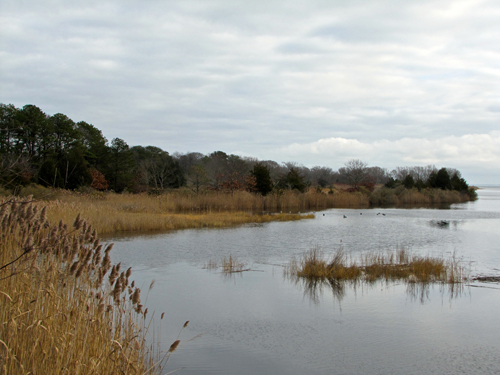County eyes 94-acre Broad Cove property for preservation

A 94-acre former Duck Farm adjacent to Indian Island County Park could be preserved by Suffolk County as open space after the county legislature authorized an appraisal of the property last week.
The site once was approved by Riverhead Town for 500-condominium units and boat slips back in 1975, and that number was reduced to 396 units in the late 1980s. However, it was never developed, as a state supreme court judge overturned the permits in 1993 in response to a lawsuit filed by the North Fork Environmental Council.
Broad Cove was considered by the Nature Conservancy in 2007 to be one of the three most important properties for preservation in Riverhead Town, along with the 55-acre River Club on Riverside Drive and the 77-acre Hubbard Duck Farm property on Hubbard Avenue, both of which have since been acquired as open space.
North Fork County Legislator Al Krupski (D-Cutchogue) said he was the one who resurrected the effort to preserve the site, after a meeting with a resident about a proposed wetland restoration project at the adjacent Indian Island park. The resident brought up the history of Broad Cove and Mr. Krupski subsequently contacted the Nature Conservancy about it.
“I’m optimistic that the county will be able to get the money to make this happen,” Mr. Krupski said in interview. “For something like this, I would hope so. It’s an important parcel to the health of the Peconic Estuary.”
At the legislature’s environment, planning and agriculture committee on Dec. 8, Randy Parsons of the Nature Conservancy urged preservation of the property.
“The Nature Conservancy considers this one of the top 10 properties in Nassau/Suffolk that are still in private hands and need to be protected,” Mr. Parsons said.
“Flanders Bay is a stressed watershed in terms of water quality. Protecting Broad Cove will help to avoid further deterioration in Flanders Bay and it will give us an opportunity to improve it.”
The property is currently zoned “Tourism/Resort Campus,” a zone that will permit hotels with docking facilities and health spas with a special permit, and will allow bed and breakfasts, county inns, country clubs, and recreational or sporting clubs as outright permitted uses.
Mr. Parsons said there’s been discussion as to whether the Riverhead Sewer District would have enough capacity for Broad Cove to hook into it.
“But in any case, having that property developed with lawns and landscaping and fertilizer and possibly an on-site septic system — it’s not going to help the bay,” he said.
The duck farm use has been abandoned for almost 30 years.
The property, under a prior owner, Norman Felske of Quogue, received a special permit for 500 condos and boat slips in 1975, and had renewed the permit five times before the state Department of Environmental Conservation fined him $500,000 for illegally bulldozing wetlands. The town refused to renew the permit in 1988 and Mr. Felske sued, with a judge upholding his permits. The Town Board at the time then voted to renew the permit if Mr. Felske agreed to reduce the number of condos to 396. That approval was successfully challenged in court by the NFEC.
“This has been one of our key priority properties for acquisition for at least 15 years,” said Loretta Fisher of the county planning department. The parcel is located between Terry Creek and Meetinghouse Creek, which both enter into the Peconic Estuary, and is just east of Indian Island county park, she said.
Mr. Krupski said he believes the county will have to acquire the site on its own, as New York State and Riverhead Town have limited funds for acquisition. In fact, Riverhead’s fund for buying up land is “bankrupt,” according to the town supervisor; Riverhead owes debt on its community preservation fund for borrowing against future revenues in previous years.
The property’s owner, Stanley Weiss of Smithtown, has submitted a letter indicating he is willing to sell the land for preservation, Mr. Krupski said.
The county had agreed to pay $8.5 million for the property in 1999 but later dropped its offer to $6 million, according to News-Review reports at the time. The deal fell apart when the county said the owner had reneged on a promise to remove some old structures associated with the duck farm and to clean up residual soil contamination, according to reports at the time.







